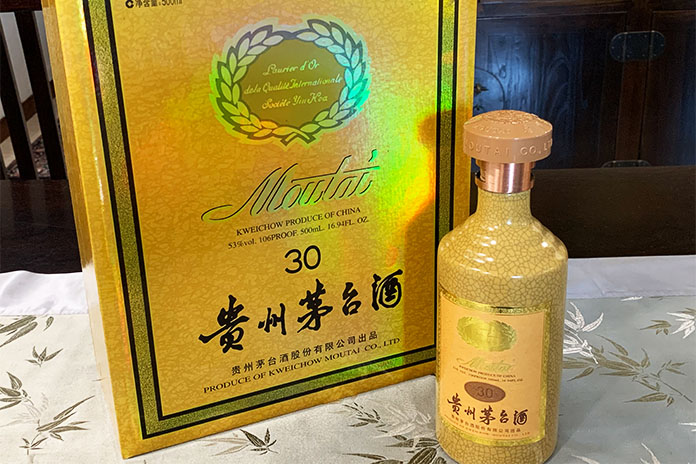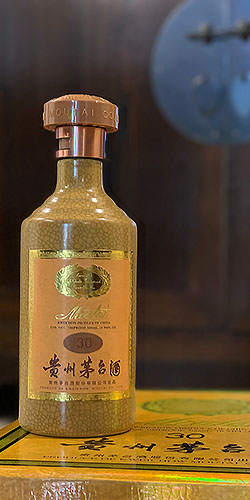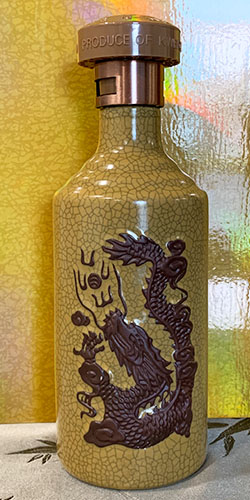
AS THE metal rat is about to scurry in, the Spirit Guide reckons you might want to uncork some tradition and pour it neat into a glass.
Kweicho Moutai is probably the most revered and the most famous brand of liquor in China.
Served to presidents and dignitaries at state functions and national events, it also had a share of negative publicity related to collusions, personal favours and ostentatious consumption.
The listed company behind it, Kweichow Moutai Co Ltd, also holds the title of being the world’s most valuable alcoholic beverage producer with a market value of S$270 billion!
It is more talked about than it is enjoyed by the lay consumer. It also gained some notoriety especially since its rise to stardom and prestige caused prices to jump and counterfeits to be distributed in abundance.
Such is the mystic surrounding this wonderful nectar we felt it was time to clear the air.
The liquor itself, commonly known and spelt as maotai, is made by distillation of grains (such as sorghum and wheat) in water. Its ingredients are no different from sake or home-brewed rice wine, essentially grains and water.
Prices for “entry level” YingBin (translated as “welcome guests”) Kweichow Moutai, at People’s Park Complex start from around S$60 for a 500ml bottle.
However, if you are thinking of gifting a business partner or opening up a respectable bottle for a dinner celebration, you would prefer the premium Flying Fairy Maotai by Kweichow Moutai. That will cost S$500 for a 500ml bottle.
A bottle of the 30-year vintage will cost around S$3,000.
 How does it taste?
How does it taste?
Such a wonderful liquor has to be enjoyed neat. Unadulterated.
And small sips, please.
A few friends and I had a taste of the 30-year vintage over dinner. These were their comments.
One took a sip and said it was like “fire down her throat”.
“It tasted pleasant. I was surprised at how easy it went down my throat, with an after effect akin to eating wasabi” and “the strong alcohol shot up to the brain and cleared the nasal passage.”
“A slight smoky flavour, traces of sweet barley around the edges of the palate. As I swallowed, it went down smooth and refreshing, just like drinking fresh spring water”.
“While it was spicy (due to the alcohol “burn”?), there was some tanginess on my lips as I sipped, but it was absolutely smooth at the same time. I think there were some woody notes in the aftertaste, which gave it a full-bodied finish.”
One friend summarised his maotai experience best.
- Smell — tempting with its sweet aroma.
- First sip — sweet yet crisp, but with a burn that can be felt down the side of the tongue.
- In taste — rich thick flavour with subtle sweetness almost like honey but not quite, and the smell lingers as a soft fragrance.
- After taste — sweet in the throat, leaving a warm and pleasant sensation.
 Well, at 53% alcohol content, most drinkers not used to the strength of hard liquors such as whiskey would describe their sensations in rather extreme terms. The strong alcohol sensation, the after taste and the concentrated, intense warm feeling moving down from the chest to the stomach is something we can enjoy and quickly get used to.
Well, at 53% alcohol content, most drinkers not used to the strength of hard liquors such as whiskey would describe their sensations in rather extreme terms. The strong alcohol sensation, the after taste and the concentrated, intense warm feeling moving down from the chest to the stomach is something we can enjoy and quickly get used to.
The high-quality, premium labels of Kweichow Moutai are liquors that have been distilled multiple times. Impurities are purged with each step of the distillation process. We can enjoy the drink in the comforting belief that we will not wake up with a demolition ball of a hangover pounding — to get in or out? — at our heads the morning after.
The only downside I have not been able to get use to is the sickly-sweet fragrance. If just one guest at a Chinese dinner table has a small sake-cup of maotai, everyone at the table will sense the exceptionally sweet, strong, flowery-barley smell. Did someone forget to rinse off the soap from their hands?
Be warned that prized liquors are plagued by knock-offs. Best to get your spirit in the bottle at an official source, Singapore Moutai Baiju.





















